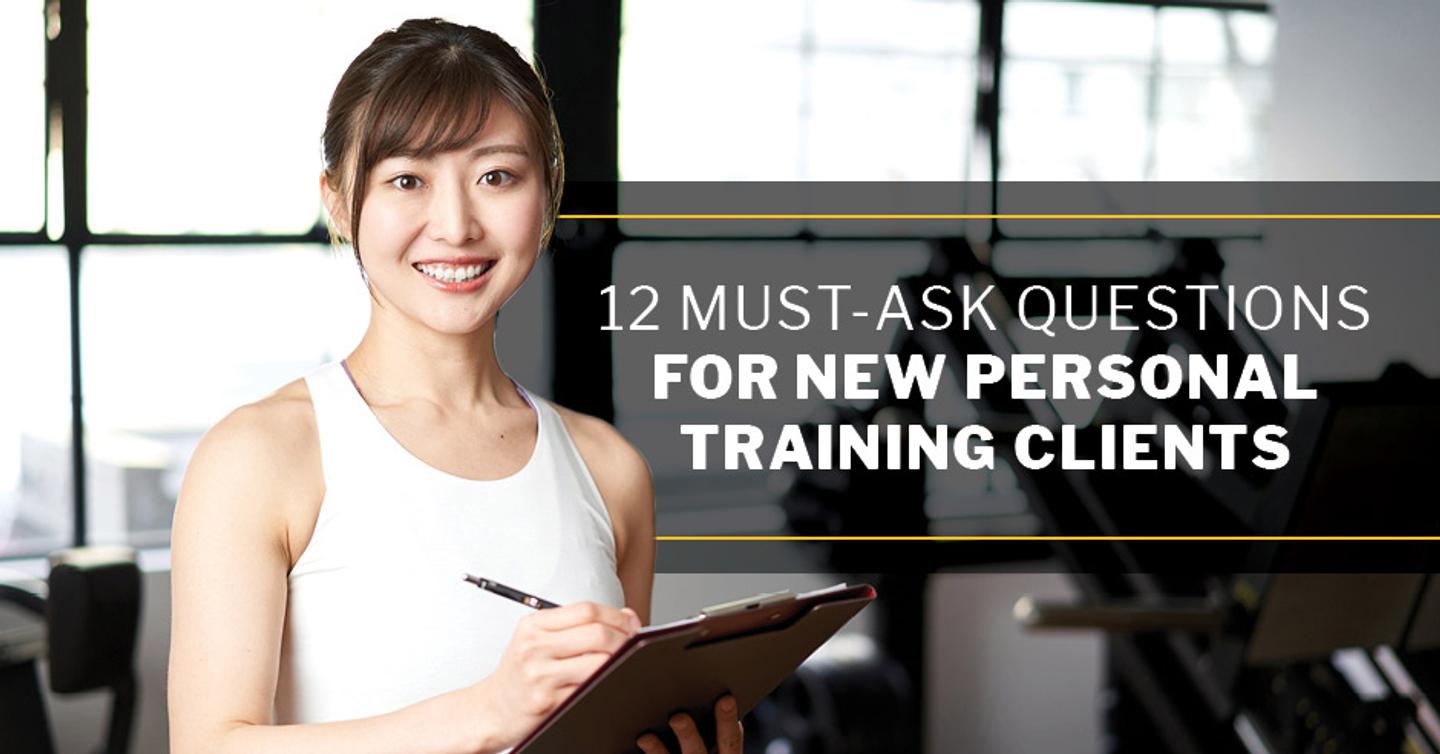
12 Must-Ask Questions for New Personal Training Clients
Reading Time: 7 minutes 33 seconds
BY: ISSA
DATE: 2023-05-16
In your consultation with new personal training clients, asking questions serves a few valuable purposes.
One, their answers provide insight into that potential client. You’ll learn what they expect, both from the exercise program and from you as a personal trainer. You’ll also get a better idea of what strategies may work best for keeping them inspired and motivated.
Two, asking questions during the initial consultation is an opportunity to begin to establish rapport. It tells the prospective client that you care—that you want to see them succeed. Greater rapport increases their trust in you. It also encourages them to be honest about what is working and what isn’t. This gives you the ability to change the program when needed versus them walking away from it (and you) completely.
Third, the right questions will establish you as a fitness professional. Think about it from a client standpoint. How would you feel if your trainer asked no questions before your first personal training session? Or if they asked questions that didn’t seem to matter? Would you feel confident in their abilities without a thorough pre-exercise consultation? Probably not.
So, what types of questions are part of a solid personal trainer interview that satisfies all these purposes? Here are 12 to get you started.
#1: What Is Your Fitness Goal?
You can have the best personal training certification in the world, but if you aren’t able to help clients reach their goals, good luck building a successful fitness business. Asking this question tells you what they want to accomplish. It gives insight into the results they expect from their training.
Are they after weight loss or increased lean muscle mass? Maybe their goal is to be able to walk up the stairs without being out of breath. Or they want to lose body fat so they feel more confident when entering a room. Achieving this result will make your training a success in their eyes.
Their answer to this question also allows you to assess whether they have realistic goals. If they don’t, now is the time to correct their expectations. Educate them about what to expect so they aren’t disappointed.
#2: Why Is This Goal Important to You?
Once you know their goals, ask why they want to reach them. What drives them to want to change their body composition or establish an exercise routine?
Without a strong why, they may be inclined to give up before seeing their desired results. As a personal trainer, you can also use their why to motivate them along the way. Remind them why they’re doing such an intense workout. Help them visualize themselves getting closer to achieving their goal.
#3: Have You Tried to Reach That Goal in the Past?
One reason this question is important is that it gives you some idea of the client’s journey to where they are today. Have they tried every diet in the book only to never achieve lasting results? Or is this their first attempt to lose weight?
If they’ve tried to reach their goal previously, what worked for them? What didn’t? Incorporate the aspects that brought them results and bypass the ones that didn’t. Use their past experiences to create a program that is more suited to them, increasing their likelihood of finally achieving what it is they want.
#4: What Type of Physical Activity Do You Do Regularly, If Any?
Is your training session the only activity they’ll do each week? If not, what other exercise do they get regularly? Maybe they hit the golf course a few times a month or enjoy a weekly game of 3-on-3 basketball with their friends.
Getting an idea of how active they are will help you decide what level of intensity to begin with. It also tells you where you may want to place your focus when creating their training program. If they play golf often, for instance, building more strength in their upper body and core can help them power their swing.
Gaining a better understanding of their weekly activity may even keep you from overworking or overtraining certain muscle groups. It exposes where efforts should be placed during their workout for a more well-rounded routine.
#5: What Type of Exercise Do You Enjoy?
If you want to be a successful fitness trainer, ask clients to do exercises they enjoy. This makes it seem like less of a workout and more like a fun time that just happens to take place at the gym.
What happens if the client says they don’t like any form of exercise? Give them a list of options—such as kickboxing, walking, or cycling—and ask if there are any that might interest them. Keep trying new things until they find something that they look forward to doing.
Let them know that it’s a bit of a trial-and-error process and that you’re willing to walk with them until they find activities that they like to do. Explain that you want them to have fun with fitness and this is the first step.
#6: What Are Your Thoughts About Strength Training?
Why would you ask this during your consultation with a new client? Weight training is part of a complete fitness program. However, some people have preconceived ideas about lifting weights that may make them not want to experience this part of the gym.
Female clients, for instance, may fear getting bulky muscles. By asking this question upfront, you get the opportunity to correct any misconceptions. It also gives you an idea as to how quickly or slowly you may want to acclimate them to the use of weights.
#7: What Would Your Perfect Fitness Program Look Like?
Clients won’t stick with a training program that doesn’t fit into their lifestyle. While you may not be able to give them everything they want, the closer you can get to a client’s ideal, the greater the likelihood that they’ll stick with the program long-term.

Here are a few questions to help drill down their answer even more:
How many days a week would you exercise?
How long would each session be?
What time of day would you work out?
Would you spend more time elevating your heart rate or hitting the weights?
Use their responses to develop the best routine for them.
#8: How Do You Feel About Working Out in a Gym?
Some people get anxious when they think about exercising in a gym. They fear that they’ll be judged by people in better shape. Or they’re concerned that they’ll look stupid if they don’t know how to use a specific piece of equipment.
If you know this beforehand, you can help combat their anxiousness. Help them recognize that everyone is there to become better versions of themselves. And many of the other exercisers were once in the same position they are today. So, they’re more of an ally and, often, a good source of support.
It may even be helpful to introduce them to some of your other clients or others you know at the gym. Sometimes, seeing a familiar face when they walk in the door is enough to reduce the anxiety they feel.
#9: What’s Your Idea of a “Good Trainer”?
Being a certified personal trainer means that you know how to develop a safe and effective workout program. But what is the client looking for in a trainer? Do they want someone who is a bit of a bulldog, pushing them to always do their best? Or are they more interested in working out with a personal trainer with a softer approach?
Every client is different in what they want from a trainer. Instead of trying to guess, ask this question. Then, devise a program that supplies what they need. Alternatively, if you have a style that is too different, you may want to refer them to a personal trainer who is more in line with their ideal.
#10: Are You Currently Under the Care of a Doctor?
Your intake questionnaire should already ask about health conditions. However, clients may unintentionally fail to disclose a potential issue if it is under control. Blood pressure is one example.
Your questionnaire may ask about hypertension, but they answer no because their blood pressure is controlled with the help of medications. This gives you an incomplete picture. Plus, those with high blood pressure should follow certain guidelines when exercising according to the Mayo Clinic. This includes seeking their doctor’s approval beforehand and checking their heart rate during their workout.
Asking if they see a doctor regularly for anything other than their annual physical helps reveal issues that you need to be aware of when developing a personal training regimen.
#11: Have You Ever Had Physical Therapy?
This question will reveal any past injuries. Again, your questionnaire should ask about this. Yet, it’s easy to forget that you sprained your ankle years ago. Asking about physical therapy specifically may help jog their memory. Their answer also highlights injuries that they did disclose but may have been more severe.
If they answer yes, it can be helpful to a deeper dive into their injury. How was it sustained? How long did it take to heal? Do they still experience pain in that area? The more you know, the greater your ability to keep from injuring that area again.
#12: What Do You Typically Eat in a 24-Hour Period?
Even if your expertise is in exercise, nutrition plays a role in the client’s ability to reach their goals. As the old saying goes, “you can’t out-exercise a bad diet.” This question opens the door to provide advice that supports the client’s workout regimen. Talk about how what they eat affects not only their results but also how they feel.
If the client struggles with their diet, you may suggest that they speak with a nutritionist or dietitian. Explain that nutrition plays a role in how their body functions and the amount of energy they have throughout the day. Reinforce that they can often see positive results with just a few minor tweaks to their menu plan.
When Asking These Questions for New Personal Training Clients…
Your personal training questionnaire may already touch on some of these areas. However, asking these questions face-to-face can provide a more thorough response than simply including them on your questionnaire form.
Personal training forms can provide a base level of information. But what they lack is the ability for the client to expand on a specific topic. They also lack the back-and-forth conversation that bolsters rapport. So, using forms is good but they should be more of a starting point than a finish line.
Then, use a client’s answers to seek more clarity or gain more insight. The more you understand your client, the greater your ability to give them what they want as well as what they need to hit all their fitness goals.
What if you could take your personal training career to the next level? With an Elite Trainer Certification from ISSA, you can reap the benefits of Elite status by becoming a Nutritionist, plus selecting another advanced specialization of your choice. Learn more.